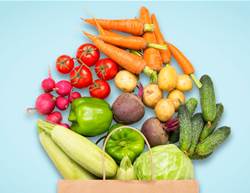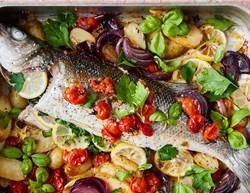Eating healthy doesn't have to be fussy. Nor does it mean you have to go hunting for exotic ingredients. We turned to top nutritionists for the unexpected kitchen heroes they return to meal after meal. These incredible foods flood your body with nutritional benefits, ward off inflammation, and can help you slim down. Oh, and did we mention they're really delicious, too?












Lentils
THE BENEFITS "Lentils are loaded with disease-fighting phytochemicals [antioxidants that can lower the risk of cancer, diabetes and heart disease]; minerals such as iron, zinc, and potassium; and vitamins such as folate," says nutritionist Julieanna Hever. These edible pulses, part of the legume family, are also rich in fibre to help keep your digestive system functioning well.
TIP Replace half the ground beef in your favourite burger recipe with lentils--add a lightly beaten egg to help bind the mixture.
Balsamic Vinegar
THE BENEFITS Turns out, this pantry favourite is a boon for your health. "Wine gets all the good press, but since balsamic vinegar is also made from grapes, it has significant health benefits, too. Both wine and balsamic vinegar contain polyphenols, which are antioxidants and inflammation fighters," says dietitian Kayleen St.John.
Balsamic vinegar is also a source of the powerful flavonoids known as anthocyanins. These are the same chemicals found in blueberries, which appear to help lower the risk of hypertension and heart disease by protecting arteries from the damage caused by free radicals, adds nutritionist Andy Bellatti.
TIP Add a generous splash of this heart-healthy vinegar to jarred tomato sauce and stir thoroughly before serving over pasta. It'll give the sauce an added layer of flavour with hardly any effort. Extra perk: It will taste almost homemade!
Unsweetened Cocoa Powder
THE BENEFITS Even healthy food can taste decadent, as is the case with this rich and intense flavor enhancer that you can use in smoothies or as a topper for oatmeal or yogurt.
"Two tablespoons of cocoa powder provide nearly 4 g of fibre--as much as an apple--and 16% of the daily value of magnesium, a heart-healthy mineral most people fall short on," Bellatti explains. "It also has a nice helping of flavonoids like epicatechin, which help relax blood vessels and keep blood pressure at healthy levels."
TIP To get the most out of unsweetened cocoa powder, Bellatti advises avoiding alkalized or Dutch versions, which contain lower levels of antioxidants.
Tomato Paste
THE BENEFITS With fruits and vegetables, fresh is usually best, but in the case of tomatoes, cooked and canned may be the nutritional winners.
"Research indicates you might absorb the lycopene better in cooked tomatoes versus fresh ones," says nutritionist Amy Gorin. "Tomatoes get their red colour from lycopene, an antioxidant that is linked to protection against certain types of cancer and may help reduce the appearance of wrinkles by warding off damage caused by ultraviolet radiation."
Fun fact: Just 2 Tbsp of tomato paste has more than triple the lycopene of one medium tomato!
TIP Follow the lead of Rebecca Lewis, in-house dietitian at HelloFresh, a healthy-meal delivery company: Cook tomato paste for a few minutes before combining it with a liquid (such as tomato sauce or soup). This will help get rid of any bitterness and amp up its natural sweetness.
Pumpkin Seeds
THE BENEFITS It's smart to make this autumn snack, also known as pepitas, a year-round go-to superfood.
"Pumpkin seeds are an extraordinary source of minerals, particularly the tough-to-find ones like zinc and iron," says Hever. "They also boast a wide variety of antioxidants, such as vitamin E." Plus, pumpkin seeds are rich in lignans, beneficial plant compounds that help moderate oestrogen production in your body.
TIP Shake cayenne or paprika onto the seeds. Spread in a thin layer and bake at 175°C for 20 minutes or until golden brown. Snack on them plain, add them to trail mix, or sprinkle them on soup.
Barley
THE BENEFITS This hearty grain is as tasty as it is good for you. "Barley is rich in fibre, which may reduce the risk of colon cancer and hemorrhoids and helps maintain a healthy colon, lower your blood cholesterol, and keep your heart healthy," say the Nutrition Twins, dietitians Lyssie Lakatos and Tammy Lakatos Shames.
As a bonus, the fibre helps support friendly bacteria in your gut and crowds out disease-causing microbes. A 2016 review in the European Journal of Clinical Nutrition that looked at 14 trials found that barley helps keep bad cholesterol in check and may lower the risk of heart disease, thanks to its beta-glucans, the sugars found in barley and certain other plant-based foods like oats and rye.
TIP If hunger pangs often get the best of you, your diet may be lacking filling fibre and protein. Try front-loading your lunch or dinner with a protein-rich chicken broth-based soup and adding 1/2 cup of cooked barley to make it more satisfying.
White Potatoes
THE BENEFITS They get a bad rap, but if you ditch the oil and copious quantities of butter, white potatoes are a kitchen staple worth befriending. Clocking in at about 585kJs per 150g potato, spuds are an excellent source of fibre, helping to keep you satisfied and prevent constipation.
Plus, "they contain high-quality carbohydrates that fuel the brain and muscles with energy, along with vitamins, minerals, and phytochemicals," say the Nutrition Twins, who add that these veggies can also help keep blood pressure levels in check.
TIP For a side dish that won't leave you hungry, make fries--sans the fryer. Heat oven to 230°C. Slice potatoes into thick wedges and top with garlic powder, black pepper, and a thin coating of olive oil (use a pastry brush). Roast in the oven about 45 minutes.
Cauliflower
THE BENEFITS You can feel free to pile your plate with this cruciferous veggie as often as you'd like. "Cauliflower is packed with glucosinolates, phytonutrients that help fight inflammation and promote detoxification," says Hever. "It's also chock-full of vitamin C and other antioxidants."
TIP To make "rice," cut a washed head of cauliflower (greens removed) into large chunks. Run them on the medium side of a box grater or pulse in a food processor with the grater blade until fine. Add a splash of vegetable broth and saute, covered, 5 to 8 minutes. Season as desired and use as a base in burritos, tacos, or any dish that calls for rice. A potato has even more potassium than a banana. Who knew?
Artichokes
THE BENEFITS This complex vegetable--you can eat only parts of the leaves and the center "choke"--stymies many home cooks, but adding artichokes to your vegetable repertoire is worth the effort. "Artichokes are rich in soluble fibre, which helps block the absorption of cholesterol," says ntritionist Lisa Hayim. In fact, artichokes are superstars when it comes to fibre--one medium artichoke has nearly 7 g, about a third of the 25 g women need daily.
"Artichokes are also rich in antioxidants and therefore considered helpful for anti-aging. The antioxidants protect the body from the cellular damage that results from free radicals and that can lead to heart disease and Alzheimer's," says Hayim.
There's more: Artichokes contain potent anti-inflammatory compounds and polyphenols that fight disease, including cancer. University of Illinois researchers have found that artichokes may even help kill pancreatic cancer cells. And the vegetable is rich in vitamin C, folate, and magnesium.
TIP The trick to a perfect artichoke dish is to choose artichokes in their prime. Look for ones that feel heavy in your palm (lighter artichokes are likely older) and have rich green leaves that are firmly closed.
Parsley
THE BENEFITS Typically used as a garnish and pushed to the side of the plate uneaten, this zingy herb belongs in your regular cooking arsenal. "Parsley allows you to add flavour to meals for very few kilojoules," says Gorin. "One tablespoon of fresh parsley has one calorie."
The herb is also a rich source of antioxidants. And if you're looking to boost your intake of vitamin K--crucial for strong, healthy bones--look no further than these dainty green leaves and stems.
TIP Switch up a traditional pesto by replacing basil with parsley.
Chia Seeds
THE BENEFITS These tiny seeds pack a mighty punch. "One of their many perks is their ability to increase satiety and keep us feeling full. They can absorb about 10 times their weight in water, which creates a gel-like substance that moves slowly through our GI tract," says St.John.
This spongelike property slows the absorption of glucose in the bloodstream and keeps blood sugar levels steady. Chia seeds also serve up a variety of nutrients, like fibre, calcium, iron, and zinc.
TIP Slip a tablespoon or two of chia seeds into your morning smoothie. They're virtually flavoorless, but they add a powerful nutrient boost and help you feel full until lunchtime.
Sauerkraut
THE BENEFITS There's a lot of buzz about probiotics for good reason: These beneficial bacteria work to keep your gut healthy. "Probiotics may boost immunity, alleviate symptoms of IBS, prevent colon cancer, and improve mood," says Hayim. Perhaps one of the most delicious probiotic sources is sauerkraut.
TIP Buy only refrigerated sauerkraut or make it yourself. The canned kind is heated during manufacturing, which can kill the beneficial probiotics, says St.John.









